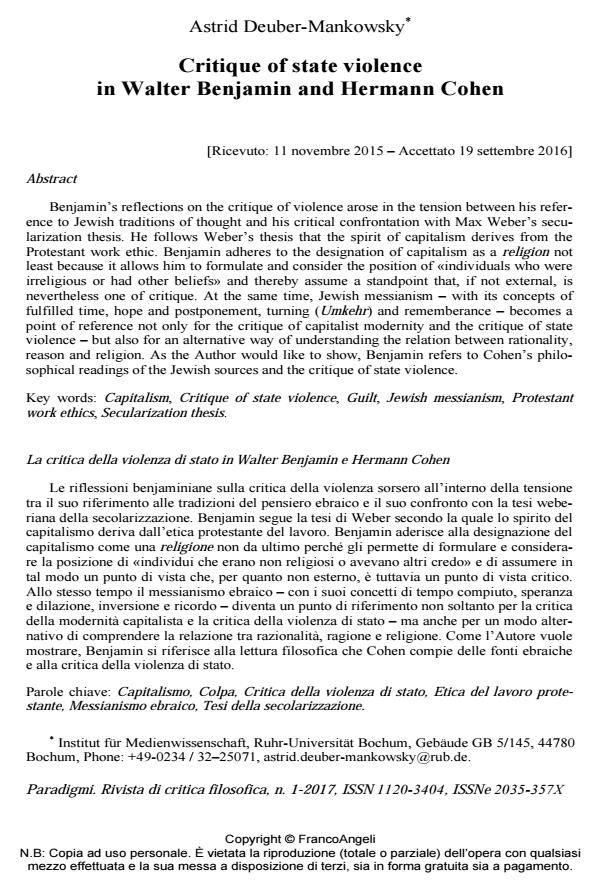Critique of state violence in Walter Benjamin and Hermann Cohen
Journal title PARADIGMI
Author/s Astrid Deuber-Mankowsky
Publishing Year 2017 Issue 2017/1
Language English Pages 15 P. 113-127 File size 208 KB
DOI 10.3280/PARA2017-001008
DOI is like a bar code for intellectual property: to have more infomation
click here
Below, you can see the article first page
If you want to buy this article in PDF format, you can do it, following the instructions to buy download credits

FrancoAngeli is member of Publishers International Linking Association, Inc (PILA), a not-for-profit association which run the CrossRef service enabling links to and from online scholarly content.
Benjamin’s reflections on the critique of violence arose in the tension between his reference to Jewish traditions of thought and his critical confrontation with Max Weber’s secularization thesis. He follows Weber’s thesis that the spirit of capitalism derives from the Protestant work ethic. Benjamin adheres to the designation of capitalism as a religion not least because it allows him to formulate and consider the position of «individuals who were irreligious or had other beliefs» and thereby assume a standpoint that, if not external, is nevertheless one of critique. At the same time, Jewish messianism - with its concepts of fulfilled time, hope and postponement, turning (Umkehr) and rememberance - becomes a point of reference not only for the critique of capitalist modernity and the critique of state violence - but also for an alternative way of understanding the relation between rationality, reason and religion. As the Author would like to show, Benjamin refers to Cohen’s philosophical readings of the Jewish sources and the critique of state violence.
Keywords: Capitalism, Critique of state violence, Guilt, Jewish messianism, Protestant work ethics,
- Benjamin W. (1991). Das Passagen-Werk. Aufzeichnungen und Materialien, J75,2. In: Tiedemann R., ed., GS V, I. Frankfurt a. M.: Suhrkamp Verlag: 455-456.
- Benjamin W. (1996). Capitalism as Religion. In: Bullock M., Jennings M.W., eds., SW I. Cambridge, MA: Belknap Press: 288-291.
- Benjamin W. (1996a). Critique of Violence. In: Bullock M., Jennings M.W., eds., SW I. Cambridge, MA: Belknap Press: 236-252.
- Benjamin W. (1999). Franz Kafka. On the Tenth Anniversary of his Death. In: Jennings M.W., Eiland H. and Smith G., eds., SW II. 2. Cambridge, MA: Belknap Press: 794-818.
- Benjamin W. (2002). Theological-political Fragment. In: Jennings M.W. and Eiland H., eds., SW III. Cambridge, MA: Belknap Press: 305-306.
- Benjamin W. (2003). On the Concept of History. In: Jennings M.W. and Eiland H., eds., SW IV. Cambridge, MA: Belknap Press: 401-424.
- Butler J. (1997). Excitable Speech: A Politics of the Performative. New York: Routledge.
- Butler J. (2006). Critique, Coercion, and Sacred Life in Benjamin's “Critique of Violence”. In: de Vries H. and Sullivan L.E., eds., Political Theologies: Public Religions in a Post-secular World. New York: Fordham University Press: 201-219.
- Cohen H. (1977). Ethik des reinen Willens. In: Holzhey H. et al., eds., Werke, vol. VII. Hildesheim: Georg Olms Verlag.
- Cohen H. (1995 a). Religion der Vernunft aus den Quellen des Judentums. Eine jüdische Religionsphilosophie. Nach dem Manuskript des Verfassers neu durchgearbeitet und mit einem Nachwort versehen von B. Strauß. Wiesbaden: Fourier.
- Fenves P. (2011). The Messianic Reduction: Walter Benjamin and the Shape of Time. Stanford, CA.: Stanford University Press.
- Habermas J. (1992). Faktizität und Geltung. Beiträge zur Diskurstheorie des Rechts und des demokratischen Rechtsstaats. Frankfurt a. M.: Suhrkamp Verlag.
- Holzhey H. (1994). Neukantianismus und Sozialismus. Einleitung. In: Holzhey H., ed., Ethischer Sozialismus. Zur politischen Philosophie des Neukantianismus. Frankfurt a. M.: Suhrkamp Verlag: 7-34.
- Kant I. (1977). Zum ewigen Frieden. In: Weischedel W., ed. Werkausgabe, vol. XI, Schriften zur Anthropologie, Geschichtsphilosophie, Politik und Pädagogik I. Frankfurt a. M.: Suhrkamp Verlag: 195-251.
- Löwy M. (2009). Capitalism as Religion: Walter Benjamin and Max Weber. Historical Materialism, 17: 60-73,
- Scholem G. (1975). Walter Benjamin: Die Geschichte einer Freundschaft. Frankfurt a. M.: Suhrkamp Verlag.
- Weber M. (1920). Gesammelte Aufsätze zur Religionssoziologie. Bd. I. Tübingen: Mohr Siebeck Verlag.
- Weber M. (1930). The Protestant Ethic and the Spirit of Capitalism. New York: Charles Scribner’s Sons (Engl. transl. by T. Parsons).
Astrid Deuber-Mankowsky, Critique of state violence in Walter Benjamin and Hermann Cohen in "PARADIGMI" 1/2017, pp 113-127, DOI: 10.3280/PARA2017-001008